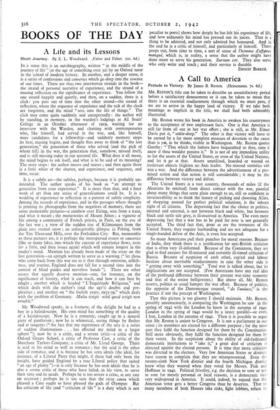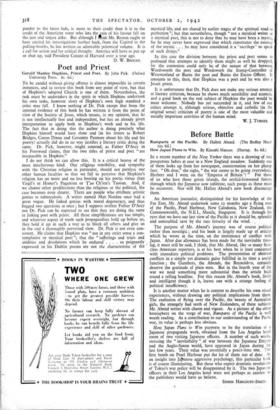A Call to America
Prelude to Victory. By James B. Reston. tHeinemann. 78. 6d.)
MR. RESTON'S title can be taken to describe an unsatisfactory period before a satisfactory denouement or it can be taken to mean that there is an essential readjustment through which we must pass, if we are to arrive in the happy land of victory. If we take both meanings as implicit in the title, we shall find both admirably illustrated.
Mr. Reston wrote his book in America to awaken his countrymen to the acceptance of two unpleasant facts. One is that America is still far from all out in her war effort ; she is still, as Mr. Elmer Davis put it, "ankle-deep." The other is that victory will have to be earned by a far more complete measure of devotion to the cause than is yet, as he thinks, visible in Washington. Mr. Reston quotes Goethe : " That which thy fathers have bequeathed to thee, earn it anew if thou wouldst possess it." It is not of any immediate utility to list the assets of the United States, or even of the United Nations, and let it go at that. Assets unutilised, hoarded or wasted on irrelevant objects frighten no Axis leader. No massed statistics can win a war. And the difference between the advertisement of a pro- mised action and that action is still considerable ; it may be the difference between victory and defeat.
The United States is a vast country, thousands of miles (if the Aleutians be omitted) from direct contact with the war, puzzled about many things that seem plain enough to us, still so confident in invulnerability as to think the luxury of picking and choosing Allies, of shopping around for perfect political solutions, is the inborn right of all citizens. The depressing fact that the choice in politics, internal and external, is not between black and white, but between black and tattle tale grey, is ill-received in America. The even more depressing fact that a war has to be paid for now is not generally accepted. The third fact that, great as are the resources of the United States, they require husbanding and are not adequate for a single-handed defeat of the Axis, is even less accepted.
So many Americans pull their punches for moral reasons. Because of India, they think there is a._ justification for anti-British criticism that is often very ill-informed. Because of the Comintern, they are glad to find excuses for ill-natured and certainly ill-timed criticism of Russia. Because of suspicion of each other, capital and labour hesitate about inevitable readjustments in case the other side is " getting away with something." Total war is talked about, but its implications are not accepted. (Few Americans have any real idea of the profound difference between their present war-time economy and that of the senior belligerents.) But above all, Mr. Reston asserts, politics as usual hamper the war effort. Because of politics, the opposite of the Dantonesque counsel, "de l'audace," -is the practice if not the precept of Washington.
That this picture is too gloomy I should maintain. Mr. Reston, possibly unconsciously, is comparing the Washington he saw in the spring of 1942 with the Limdon he knew in the autumn of 1940. London in the spring of 1940 would be a juster parallel—or even, I fear, London in the autumn of 1942. Then it is possible to argue that Mr. Reston is unjust to Congress. It is not a parliament in our
sense; members are elected for a different purpose ; for the most part tey fulfil the function designed for them by the Constitution. Still more obviously, they fulfil the function designed for them by their voters. In the scepticism about the ability of old-fashioned democratic institutions to " take it," a great deal of criticism is directed againk the elected persons. It is time that more criticism was directed to the electors. Very few American States or districts have reason to complain that they are misrepresented. Even the twenty-sixth New York district and the fourth Michigan district knew what they wanted when they voted for Messrs. Fish and Hoffman in 5940. Political frivolity, e.g. the decision to vote or not to vote for merely personal or local reasons, is a democratic vice very widespread in America. It could, indeed, be argued that the American voter gets a better Congress than he deserves. That so many members of both Houses take risks, fight lobbies, refuse to pander to the latest fads, is more to their credit than it is to the credit of the American voter who lets the,iain of his favour fall on the just and unjust alike. But although I Slink Mr. Reston ought to have carried his investigations further back, from the Capitol to the polling-booths, he has written an admirable polemical volume. It is a call for action and for critical thought. America will have to put up or shut up, said President Conant of Harvard over a year ago.
D. W. BROGAN.



























 Previous page
Previous page